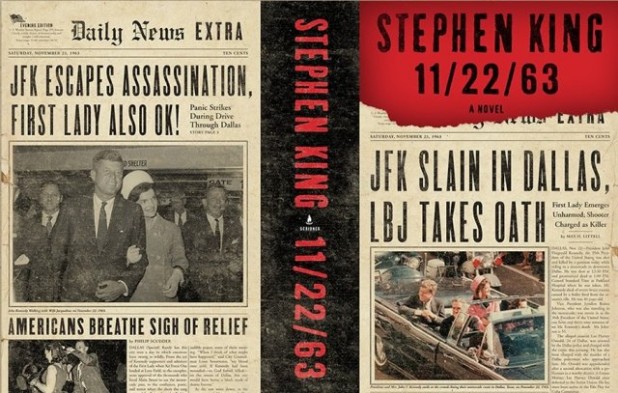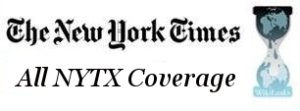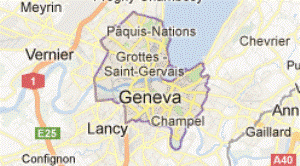BOOKS » REALITYCHEX » ROSS DOUTHAT
Ross Douthat’s Mythbuster Fail
November 27, 2011 · 2 Comments

By Marie Burns:
New York Times columnist Ross Douthat is angry that “the cult of John F. Kennedy has” survived with “the resilience of a horror-movie villain.” In today's column, Saint Ross has come to slay the zombie cult.
Douthat wraps a critique of the Kennedy presidency around a review of Stephen King's newly-published novel 11/22/63, a story in which the protagonist travels back in time to try to stop Lee Harvey Oswald from killing President Kennedy. Douthat has apparently read part of the novel. I say “part of” because Douthat seems unaware that King, whom Douthat dismisses as “the bard of the baby boom,” writes a pessimistic alternative history predicated on President Kennedy's survival. But hey, King places his alternate history near the end of the novel, and it's a lo-o-o-ng novel. Douthat has better things to do than waste time reading a book he plans to pan anyway.
Three reviewers who actually read the novel are Errol Morris for the New York Times Sunday Book Review, Janet Maslin for the Times, and Jeff Greenfield for the Washington Post. (Morris's interview of King is pretty fascinating.) Suffice it to say you'll be more inclined to pick up a copy of 11/22/63 if you read these reviews instead of relying on Douthat's suppositions as to what the story may tell.
Of course Douthat introduces the King novel merely as an excuse to bust the Kennedy “myth.” Douthat is horrified that “In Gallup’s 'greatest president' polling, J.F.K. still regularly jostles with Lincoln and Reagan for the top spot.” Reagan! This, Douthat concludes is the result of “false premises” posed by “the Kennedy cult.” The Kennedy cult, it turns out, is a multimillion-person band of demented geezers: Douthat laments that the false premises “will no doubt endure so long as the 1960s generation does.” If only we would die quickly! Douthat was born in November 1979, 16 years after Kennedy's assassination. But he studied history at Harvard, so evidently he figures he knows better than old folks suffering from a “generational obsession” with “the gauzy fantasy of the Kennedy White House.” How fortunate we doddering fools are to have the clear-headed Douthat set us straight.
The first premise Douthat attempts to debunk “is that Kennedy was a very good president, and might have been a great one if he’d lived.” Rather than actually refute this “false premise,” Douthat assures us that “few historians take this view.” He concludes, without further adieu, that
In reality, the kindest interpretation of Kennedy’s presidency is that he was a mediocrity whose death left his final grade as 'incomplete.' The harsher view would deem him a near disaster — ineffective in domestic policy, evasive on civil rights and a serial blunderer in foreign policy, who barely avoided a nuclear war that his own brinksmanship had pushed us toward.
That “harsher view” to which Douthat links is a column in The Atlantic by non-historian, reputed intellectual, and essayist Christopher Hitchens. Hitchens, too, is apparently enamored of alternate histories, as he composes one in this essay: Ike is allowed a third term, saving us from the mayhem of the Kennedy years. The fact that Eisenhower was in ill health and may have run for re-election in 1956 largely because he distrusted his vice president Richard Nixon – the likely Republican nominee if Ike didn't run – does not deter our non-historian from wishing upon Americans a perpetual Eisenhower presidency. As for Hitchens' antipathy to John F. Kennedy, I wouldn't worry about it; Hitchens holds a low opinion of Mother Theresa, too. If Hitchens is an intellectual, he is best seen as one who is against what everyone else is for.
In his gloss of “the harsher view,” Douthat covers too much ground for me to refute in any detail, but it's fair to say that some of the elements of the harsher view are exaggerated. Kennedy's “ineffective domestic policy,” for instance, included initiating the successful man-on-the-moon project. And one would think Douthat would have been delighted that Kennedy pushed through Keynesian tax cuts – today the Republican raison d'être. Like President Obama, Kennedy did use executive orders to effect some changes he couldn't get through Congress. Kennedy's best-known domestic-foreign program was perhaps the Peace Corps, originally created via executive order. (If, by the way, Douthat had read King's novel, he would have been tickled to learn that King doesn't think Kennedy would have been able to pass a meaningful domestic agenda.)
Kennedy's “evasiveness on civil rights” was certainly a bow to his Southern white flank whom he needed to get any legislation passed. In a PBS “American Experience” report critical of Kennedy's low-profile approach to civil rights advances, the authors write,
On the evening of June 11, just hours after federal marshals had escorted black students to their dormitories at the University of Alabama at Tuscaloosa [at Kennedy's direction], the president delivered a televised address to the nation. Speaking with conviction, Kennedy announced he would send comprehensive civil rights legislation to Congress. The package would include provisions for access to public facilities, voting rights, and technical and monetary support for school desegregation. 'The heart of the question,' the president said, 'is whether all Americans are to be afforded equal rights and opportunities.'
We have yet to see President Obama respond this strongly (or respond at all) to atrocities similar to racist attacks in Kennedy's day: Obama has made no public statement about the pepper-spraying of U.C. Davis students and other police torture of Occupy protesters.
As for Kennedy's “serial blunders in foreign policy,” he got a lot of help from hawkish military advisors and other holdovers from the Eisenhower administration. The disastrous Bay of Pigs invasion, for instance, was an Eisenhower-era plan spearheaded by CIA Director Allen Dulles, an Eisenhower appointee. Kennedy fired Dulles. Kennedy's handling of the Cuban Missile Crisis, by contrast, was masterful. He bucked the generals, made a deal with Soviet Premier Khrushchev, maintained U.S. supremacy in the hemisphere, and, well, saved the world from nuclear holocaust. Some blunder.
The second false premise” Douthat identifies “is that Kennedy would have kept us out of Vietnam.” Douthat tells us Kennedy would have escalated the Vietnam War. For someone who just got through belittling Stephen King's fictional history, Douthat is awfully enamored of alternative histories and crystal-ball gazing – first with Hitchens' imaginary Eisenhower third term and now with his own alternative Kennedy trajectory.
One problem: actual history doesn't support Douthat's prognostication. Kennedy inherited the Vietnam quagmire from previous administrations, and did not radically change American policy in the region. He did substantially build up U.S. “advisory” troops (and no combat troops) in Vietnam, but six weeks before his death, Kennedy instituted a disengagement policy to draw down troop strength in Vietnam. Early in his accidental presidency, Johnson reversed Kennedy's then-secret disengagement plan.
Unlike Douthat, I lived through the Kennedy years. But I had forgot many of the details of the Vietnam escalation. To refresh my memory, I turned to the reliable Wikipedia. (Other nonpartisan overviews, like this fairly helpful one from Vassar College, jibe with the Wikipedia entry.) According to the Vassar report on the Vietnam war, Kennedy's advisors were not in agreement on a course of action, and Kennedy took the middle ground in deciding to draw down troops. Ross Douthat expects us to believe that he can divine Kennedy's unrealized future actions. Here's my advice to Douthat: instead of making up stuff, do at least some minimal “research,” as I did. If you know less about a subject than what you can learn in reading a Wikipedia overview, you probably should not opine on it.
Finally, Douthat writes that “The third myth is that Kennedy was a martyr to right-wing unreason.” Douthat declares it the “purest fantasy” to blame “an atmosphere of right-wing hate somehow inspired a Marxist radical to murder a famously hawkish cold war president.” Here Douthat gleefully slams his former New York Times colleague Frank Rich. In an essay published in New York magazine last week, Rich writes about “the particular strain of virulent hatred that helped bring [John F. Kennedy] down.... There are plenty of comparisons to be made between [Presidents Kennedy and Obama], but the most telling is the vitriol that engulfed both their presidencies.” Rich goes into some detail about the culture of hate that prevailed not only in Dallas but also in right-wing circles throughout the country. If Douthat didn't have time to read Stephen King's long novel, he also seems not to have taken time to read all of Rich's article. In fact, Douthat apparently didn't even have time to look at the accompanying pictures!
I'll let you read Rich and decide if you find his analysis to be over-the-top. I don't think so. I was struck instead by the contrast between the quality of the writings of Rich and Douthat. Rich writes a carefully-researched, nuanced and balanced piece, which is in no way a Kennedy hagiography but which does broaden our understanding of the environment in which an angry, unbalanced man became an assassin. Further, Rich's insights into yesteryear provide context for a similar atmosphere that pervades our politics today and perhaps informs Douthat's own writings. Douthat scorns a generation of Americans and makes careless, largely unfounded charges against a former president. Ross Douthat vainly attempts to ridicule Frank Rich. Rich had no intention of diminishing Ross Douthat. But Douthat's hackery, when held up to the light of Rich's thoughtful, provocative work, seems mean and meaningless. Douthat self-deflates. Busts himself. Read together, the two essays tell us volumes about the state of the New York Times op-ed page, which is left with Douthat and absent Rich.
Marie Burns blogs at RealityChex.com and until recently was a popular commenter on New York Times op-ed columns. A short time ago, she began boycotting the Times because of a change in Times policies that stratifies “trusted” and “mistrusted” commenters.
By marieburns
Readers Comments (2)
Sorry, comments are closed on this post.










New York Times readers, including presidential historian Robert Dallek, refute Douthat: http://www.nytimes.com/2011/11/29/opinion/why-john-f-kennedys-legacy-endures.html?src=twr
Marie Burns
The law of unintended ceeesqunncos, utterly unpredictable, yet completely dependable, is what will save California. We live in one of the few Mediterranean climate zones of the world. Every other Med locality has sky high real-estate values and is essentially too pricey for the poor to live in. Southern California is a holdout to the model because of different vectors that have acted on population growth: massive utility projects meant cheap water and electricity, the displacement of wealthy conservative WASPs who built the those projects with wealthy liberal Jews who put a halt to further investments, the ground zero cultural upheaval of the sixties (and all its spin-offs), proximity to Mexico and absolutely filthy air for decades that drove as many people away from the region as did the collapse of aerospace.The air is now cleaner, the border with Mexico-hardening, the water and power more expensive, the mid-range jobs fewer, the welfare state is collapsing and the land values here are, even with the meltdown, still very high compared to the rest of the country. And we keep legislatively sequestering scarce private land for state parks and other statist purposes, while refusing to build new power and water facilities for the growing cities.Progressives predict with a twisted grim satisfaction that Los Angeles will turn into Rio. Ghettos of high rises, slums and right next door, the walled in rich. Perhaps. But the land in our thin coastal strip is too valuable to accede to such low returns. I think climate gravity will do a population reshuffle, forcing NAMs into the desert and beyond, perhaps into Bush’s Texas, that is if we don’t explode in an orgy of multicultural violence first.